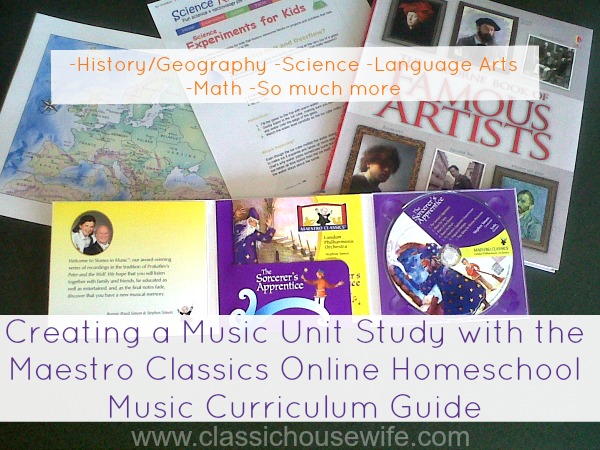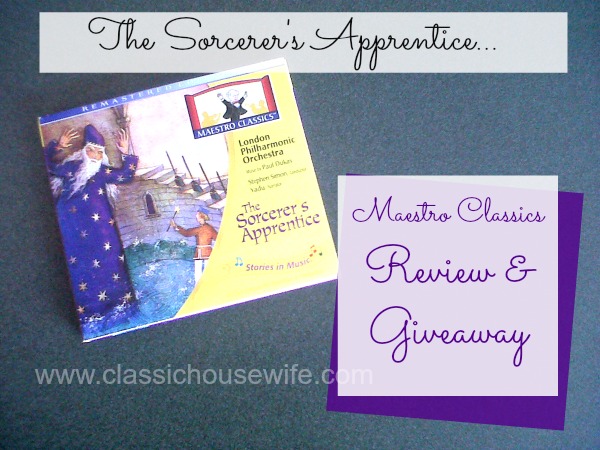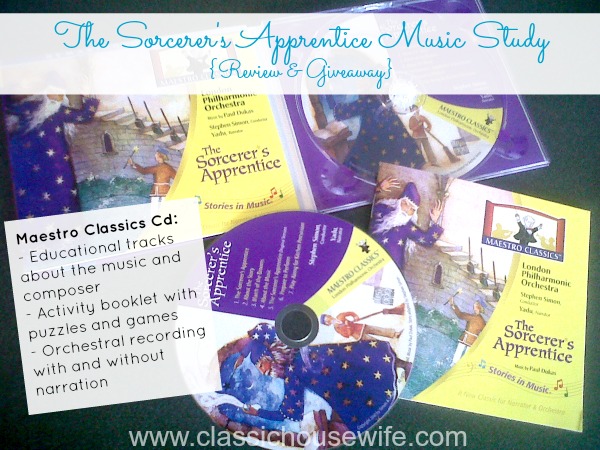[maxbutton id=”3″]
I’ve shared Maestro Classics with you before, but today I want to share more about the Online Curriculum Guides for the CDs. What are they, how can you use them to take the CD even farther, how do they help make the learning even more fun and educational?
Travel with me to 19th century France to learn about the history behind Paul Dukas’ symphonic poem, “The Sorcerer’s Apprentice!”

The Sorcerer’s Apprentice by Maestro Classics
The Sorcerer’s Apprentice is a symphonic poem (an orchestral piece that contains a story) written by 19th century French composer, Paul Dukas. The symphony, inspired by an 18th century poem by Goethe (which was probably inspired by a 2nd century Roman “fable” by Lucian,) recounts the tale of a sorcerer’s apprentice who, desiring to get out of a day’s work, attempts to try his hand at his master’s craft when things go terribly wrong. Of course, we are all probably most familiar with this story thanks to the Disney movie, “Fantasia.”
The Maestro Classics CD brings this historical (possibly fond childhood memory) to life with a lively retelling of the story against the orchestral background. The cd also includes the symphony without the narration, and of course, educational tracks with information about the composer himself, interesting elements of the music, and a fun track to “play along” with!
Now, before I go any farther, I am sure that many of you who know me well may be wondering WHY in the world we chose to use The Sorcerer’s Apprentice? Why would I choose *THIS* CD when I have a strong opinion of materials with magic and usually shy away from them? Good question! I have two answers.
- 1.) I dislike materials that promote magic as good and fun and heroic, whereas this piece includes the message that magic is something not to be trifled with, backing up my stance that magic is real, people really practice it, and we aren’t supposed to take that lightly. I feel that we can study the piece without being encouraged to think of magic as fun and good.
- 2.) Most importantly: it’s a memorable, well known piece that my children are likely to encounter at some point and there is a good educational value to be gleaned from this piece. The original story is birthed out of the mindset of First Century Rome, the subsequent symphony is indicative of the increased imaginative element to music during that time. To learn more about that and the other educational elements, I encourage you to read on!

The Maestro Classics’ Online Homeschool Music Curriculum Guides
For many of the Maestro Classics’ CDs, you can find homeschool curriculum guides on their website to help you turn your music study into a complete unit study! With recommendations for history, science, art, music, language arts, geography and math, you can pick and choose which activities and elements you want to study according to the age, ability, and interest of your children.
The Sorcerer’s Apprentice Curriculum Guide
The Sorcerer’s Apprentice was written at a time in history full of rich art and music. Peeking into the Romantic Period of Classical music, as well as Impressionism that was also popular at that time, the curriculum guide also dives into the topics of multiplication, personification, the properties of water and so much more.
Here are some of the things we studied, did and learned about while going through the study guide:
- the states and properties of water
- the Ice Melt or Overflow science experiment
- the Romantic Period, listening to suggested samples on youtube.com
- Impressionism, studying and examining the relevant paintings and authors in our books, The Usborne Book of Famous Paintings, and The Usborne Book of Famous Artits
- locating France and Germany on a map
- learning about personification, reading suggested poem samples
- writing a poem with personification

Incorporating the Curriculum Guides Into Your Homeschool Routine
While you could incorporate the Homeschool Curriculum Guide activities into your schedule in a variety of ways, we chose to adapt a method we learned from other unit studies where we covered the CD and it’s tracks over the course of a couple of weeks and then had a big “unit study day” with the curriculum guide.
We don’t study music every day, so we did music 2-3 days each week and wrapped it up with our big study day and then a review day–it looked something like this:
Day 1: Listen to Track #1, “The Sorcerer’s Apprentice” with Narration
Day 2: Listen to Track #2 “About the Story” and watch a clip of Disney’s version on YouTube
Day 3: Listen again to Track #1, then Track #3, “March of the Brooms” by the Boston Crusaders Drum & Bugle Corps and read corresponding pages 18-19 in the booklet. Read booklet pages about The Orchestra and Pitched Percussion.
Day 4: Unit study day. Listen to tracks #4 and #5, “About the Music” and “The Sorcerer’s Apprentice” (without narration,) and then dive into the various activities and resources.
Day 5: Wrap up. Listen again to Track #1, then Tracks #6 and #7, “Want to Have Some Fun?” and “The March of the Brooms” Play-Along. Talk about what you learned: elements of the story, the music, information about the Composer, etc, etc.
We could have easily stretched this out into an even longer unit study if we wanted!

Connecting the dots of learning:
I like to plug things into the bigger picture.
We have learned from previous history study that when civilizations fall, there’s a decrease in the arts because the quality and focus of life has shifted, and also that when those civilizations begin to flourish again, the arts experience as resurgence as well. So we know that when life in Western Europe finally began to improve after the Middle Ages, so did the arts- first with the Renaissance (1400’s-1600’s,) and then even more during the 1700s and 1800s with the introduction of new and imaginative movements such as Romanticism and Impressionism. These were rich times for art and music.” And it’s at this point in history that we find Paul Dukas and his imaginative and imagination-stirring piece, “The Sorcerer’s Apprentice.”
I’m no art or music scholar, but I love bigger pictures. I love seeing my kids learn how everything fits together. Yes, the kids and I could have just listened to The Sorcerer’s Apprentice on the cd, listened to the educational tracks, and we would have really enjoyed it. I don’t want to sound like I’m trying to claim that the cd is incomplete without the curriculum guide, or that you won’t enjoy the cd as it is–because you will (enjoy it.)
On the other hand, if you’re like me and you like to squeeze your homeschool resources for all their educational value, and you like to see those bigger pictures form in the minds of your little learners, I’m sure you’ll enjoy digging through the online resources, too. And I don’t know about your kids, but writing poems, doing science experiments, and flipping through art books qualifies as “fun school” in this house.

Win Your Own Copy of “The Sorcerer’s Apprentice” from Maestro’s Classics
You could buy your own cd or digital download of The Sorcerer’s Apprentice here. Or any of their other titles. You’ll enjoy them.
You can also try to win a copy of “The Sorcerer’s Apprentice” from Maestro Classics this week. US Residents (18+) will be able win a CD copy, otherwise you can win a digital download copy. Enter here to be eligible to win. The giveaway will be open for one week and the winner notified by email (with 48 hours to respond before a new winner will be selected.)
Find Maestro Classics online: Website | Facebook | Twitter | YouTube
In Full Disclosure: I received The Sorcerer’s Apprentice for free to review it. I also received compensation for my time. As always, my commitment to provide an honest review to my readers is my top priority. I am reviewing Maestro Classics because we are genuinely interested them, and we are truly enjoying them – they are indeed a gem! You can read here for more information about Reviews and Disclosure.

Until reading your review above, I have never heard of this program. Thanks for the giveaway!
Never ever? Wow! I’m glad you found this review. =) They’re great cds.
I have not used the Maestro Classics before.
I have not used Maestro Classics, but I would love to!
I have not used Maestro Classics before, but I have had my eye on it for quite a while.
I have not used Maestro Classics before, but I have had my eye on it for quite a while. I love to have my children learn the “bigger” picture too.
That’s what I found most fun about using the curriculum guide – taking a look at what else was going on in history at that time, and plugging it in to what we already knew about history. (I’m a little bit of a history fan, too.)
I have never tried Maestro Classics, but this sounds like a great musical curriculum set.
One of the cool little things about the CDs is the no one cd teaches everything there is to know about classical music. They each have their own focus and interesting little tidbits. With The Sorcerer’s Apprentice, we talked a lot about how the music was used to personify the brooms and the water, etc. We listened to the recurring melodies for each. It also focused a lot on the percussion instruments. I know I’m going to want to get all of them to see what each one has to offer.
We have one of the Cd’s the Peter & the Wolf one… love it & have been wanting to get more!
I would like to have that one!
never heard of them
I have not used any of the Maestro Classics before.
I have never used or listened to any yet, but really want to!
–Gena
We have been looking at these programs for a while. I would love to get them, but cost is an issue. Thank you for the opportunity to win!
First time hearing about this and very interested. Thanks for the review.
I hadn’t heard of them either…and I like that you don’t shy away from exposing your kids to things that may be averse to your beliefs…they need to live in the world even if they are not entirely of the world…true faith can’t exist in a vacuum.
I bought this CD maybe two years ago on Amazon.com, for my son’s “Music Appreciation” program which is mostly done in the car. It’s excellent but I didn’t know about the curriculum guide. Now I have to check that out, too! Thanks.
Learned about Maestro Classics just this week, but had no idea until now that they were more than music CDs.
I have never tried maestro classics.
I have never used their cd’s or study guides before. I will be checking into them!
I would like The Sorcerer’s Apprentice. I have not used anything from Maestro Classics yet but I am familiar with them.
I have never used this program but it looks great!
I have never tried it before but I have heard good things about it.
sounds like an awesome addition to the curriculum!
We have listened to their Carnival of the Animals, but I didn’t realize there were online curriculum guides. Thanks for sharing! (Google+ Colleen Bee)